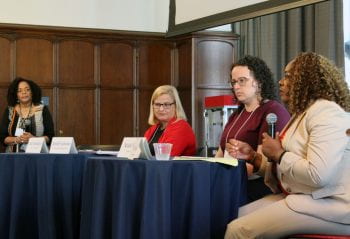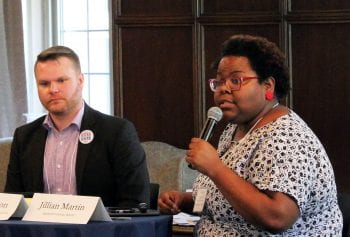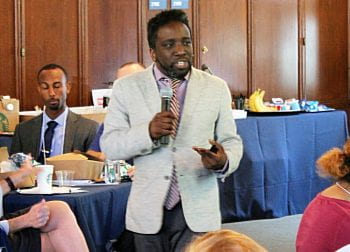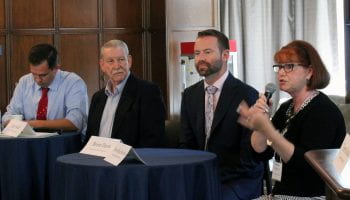On September 12 at the Brown School, representatives from regional universities, Missouri and Illinois election board members and community organizations convened for the second Campus and Community Voter Engagement Summit.
“The summit presented opportunities for key stakeholders to have a dialogue about the significance of strategies that promote student participation in voting and the importance and purpose of the decennial U.S. Census,” said Gena McClendon, director of the Voter Access and Engagement Initiative at the Center for Social Development (CSD).
CSD, the Gephardt Institute, Campus Compact and the Campus Election and Engagement Project (CEEP) cosponsored the nonpartisan event to build upon relationships, strengthen partnerships and share knowledge and resources to encourage voter registration and mobilization.

Organized into two roundtable discussions, a keynote address, a panel discussion and a guided group discussion, the summit covered a comprehensive set of topics related to voter suppression and engagement.
Vicki Washington of the St. Louis Area Voting Initiative moderated the first roundtable. Featuring Ethel Byndom from the St. Louis County Executive’s office, Natalie Furlett of Campus Compact and Jennifer Lohman from the St. Louis Area Voter Protection Coalition, it focused on the importance of counting everyone in the 2020 Census for election participation, especially student and immigrant populations.
“I have singlehandedly registered more than 35,000 people to vote over 10 years, and I know that many people—especially people on campuses with large international populations—are fearful to take the census because of all the talk of a citizenship question,” said Byndom.
“For some immigrant families, the only governmental institution they trust is their kids’ schools,” said Furlett, emphasizing the opportunity to register people to vote at K-12 schools.

Lohman discussed the urgent need for voter registration, education and protection, underscoring the final point by urging everyone to “use the voter protection hotline—866-OUR-VOTE—any time you witness any voting suppression tactic.”
The second roundtable centered on research and assessment, with McClendon, Jillian Martin of Washington University and Jacob Wilson of CEEP offering overviews of their studies. Key findings included the need to tie voter engagement strategies to larger theories of change for civic engagement, and to address the disproportionate infrastructural problems at polling places in low-income communities of color.

Verdis Robinson of Campus Compact provided the lunchtime keynote on election engagement resources for community colleges. “The road to greater justice runs through community colleges,” he said, citing that 41% of all U.S. undergraduates attend them. His presentation included practical measures to increase voter turnout among college students, such as creating student-led organizations and increasing both faculty and administration’s role in voter registration efforts. He closed with a challenge to 4-year universities: “Make sure you civically engage transfer students from community colleges.”
Four officials participated in a panel discussion on election-day challenges and various processes surrounding election law and voter registration in Missouri and Illinois.

Brent Davis, director of elections operations at the Illinois State Board of Elections, Madison County Clerk Debra Ming-Mendoza, Gary Stoff, the Republican director of the St. Louis City Board of Election Supervisors and Eric Fey, Democratic director of the St. Louis County Board of Elections, shared stories and answered audience questions.
The officials noted the vast differences between the two neighboring states’ voting laws: “In Illinois, we have 40 days of early voting and election-day registration,” stated Ming-Mendoza. Stoff made the contrast clear by mentioning Missouri’s registration deadline of “four Wednesdays before voting day, and no early voting.”
Fey called attention to college students’ tendency to “not know where they’re registered to vote,” stressing the need to register new students on campus. Moreover, Fey offered some nuts-and-bolts solutions to streamline the registration process and reduce human error: “Use a tablet or smartphone to electronically register new voters in your state’s online portal. That way, paper copies don’t get lost in your car or behind your desk, and members of my office won’t need to manually rekey information into the system.”
The summit concluded with the development of action steps to strengthen communication and collaboration between universities present. Attendees discussed ways to engage students in the local community that expand voter access and engagement and the population count conducted by the U.S. Census.
